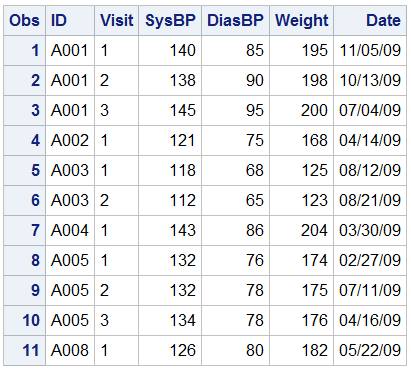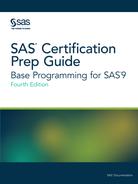Match-Merging: Details
Match-Merging Syntax
Match-merging
combines observations from two or more data sets into a single observation
in a new data set according to the values of a common variable.
When match-merging,
use the MERGE statement rather than the SET statement to combine data
sets.
|
Syntax, DATA step for
match-merging:
DATA output-SAS-data-set;
MERGE SAS-data-set-1
SAS-data-set-2;
BY <DESCENDING> variable(s);
RUN;
|
Tip
Each input data set in the
MERGE statement must be sorted in order of the values of the BY variable
or variables, or it must have an appropriate index. Each BY variable
must have the same type in all data sets to be merged.
Tip
You cannot use the DESCENDING
option with indexed data sets because indexes are always stored in
ascending order.
How Match-Merging Selects Data
During match-merging SAS sequentially checks each observation
of each data set to see whether the BY values match and then writes
the combined observation to the new data set.
data merged; merge a b; by num; run;
Figure 13.11 How Match-Merging Selects Data

Basic DATA step match-merging
produces an output data set that contains values from all observations
in all input data sets. You can add statements and options to select
only matching observations.
If an input data set
does not have any observations for a particular value of the BY-variable,
then the observation in the output data set contains missing values
for the variables that are unique to that input data set.
Tip
In match-merging, often one
data set contains unique values for the BY-variable and other data
sets contain multiple values for the BY-variable.
Example: Using Match-Merging to Combine Data Sets
The data sets Clinic.Demog and Clinic.Visit have been
sorted as follows:
proc sort data=clinic.demog; by id; run; proc print data=clinic.demog; run;
Figure 13.12 HTML Output: Sorting Clinic.Demog

proc sort data=clinic.visit; by id; run; proc print data=clinic.visit; run;
Figure 13.13 HTML Output: Sorting Clinic.Visit

You can then submit
this DATA step to create Clinic.Merged by merging Clinic.Demog and
Clinic.Visit according to values of the variable ID.
data clinic.merged; merge clinic.demog clinic.visit; by id; run; proc print data=clinic.merged; run;
Note: All observations, including
unmatched observations and observations that have missing data, are
written to the output data set.
Figure 13.14 HTML Output: Match-Merging Output

Example: Merge in Descending Order
The example above illustrates
merging two data sets that are sorted in ascending order of the BY
variable ID. To sort the data sets in descending order and then merge
them, you can submit the following program.
proc sort data=clinic.demog; by descending id; run; proc sort data=clinic.visit; by descending id; run; data clinic.merged; merge clinic.demog clinic.visit; by descending id; run; proc print data=clinic.merged; run;
Note: Specify the DESCENDING option
in the BY statements in both the PROC SORT steps and the DATA step.
If you omit the DESCENDING option in the DATA step, you generate error
messages about improperly sorted BY variables.
Figure 13.15 HTML Output: Merge in Descending Order

Last updated: January 10, 2018
..................Content has been hidden....................
You can't read the all page of ebook, please click here login for view all page.
